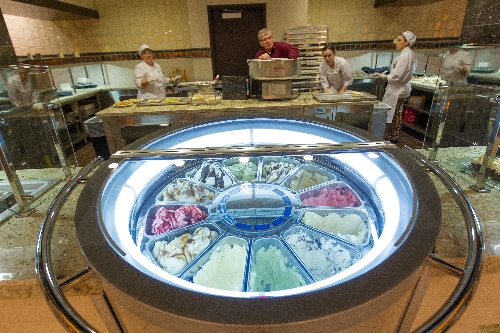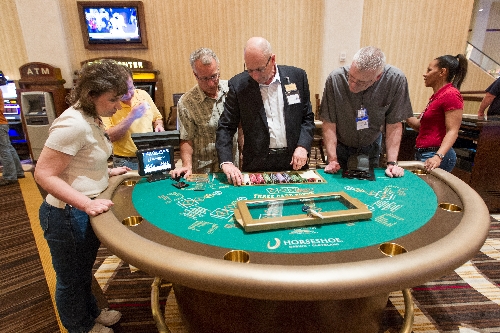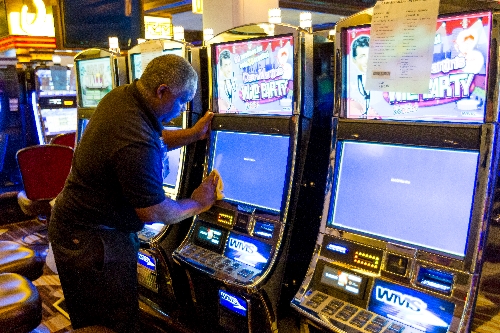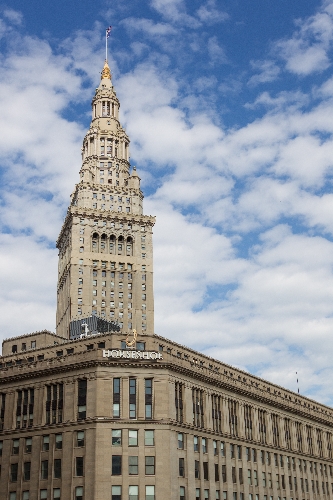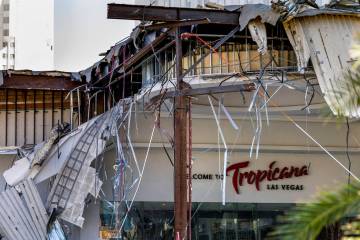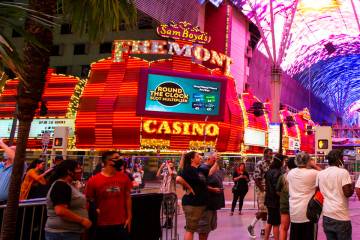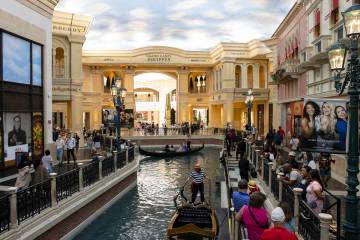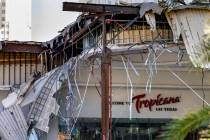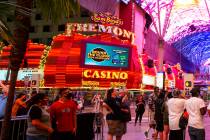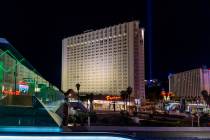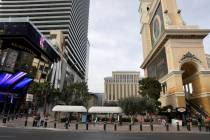Ohio draws comparison to Singapore as fertile market for casino gambling
CLEVELAND - Long before the first official hand of blackjack was dealt on Monday, the $350 million Horseshoe Casino Cleveland was credited with driving more than $7 billion in downtown reinvestment in Ohio's second-largest city.
Imagine what the next phase - which could include a second casino and a hotel - might accomplish.
Owners of the Horseshoe, one of four casinos around the state approved in a 2009 voter referendum, confidently predict the 300,000-square-foot facility on four floors of the old Higbee's Department Store building will attract 5 million visitors to downtown Cleveland each year. That would make it Ohio's top tourist draw, with 10 times the traffic of the Rock and Roll Hall of Fame and Museum on the city's Lake Erie waterfront.
David Gilbert, president of Positively Cleveland, the city's travel and promotion organization, said $2 billion of the reinvestment credited to the Horseshoe is for tourism-related development. That includes the $465 million Cleveland Medical Mart and Convention Center expected to open in 2013. Meanwhile, new or renovated hotels will soon open.
"For tourism cities like Las Vegas, New Orleans and Orlando, that's pretty standard stuff," Gilbert said. "For a second-tier Midwestern city like Cleveland, it's a pretty big deal."
Especially so for a postindustrial city best known as "the mistake on the lake" and declared in a 2011 poll by Forbes.com to be "the most miserable city in the United States."
A lot is riding on the success of casino gambling, not just in Cleveland but across Ohio, which is now the 23rd state with commercial casinos.
Analysts predict the state - with four full-scale casinos and seven slot machine-only racetrack casinos - will rival Pennsylvania as the nation's No. 3 gaming market. That's not just Buckeye boosterism: In 2011, Pennsylvania's casinos totaled $3.024 billion in gaming revenue; by some estimates one in three of those dollars came from an Ohioan.
"Ohio is the new Singapore," Janney Montgomery Scott gaming analyst Brian McGill wrote in an April investors note.
a market packed with potential
McGill's over-the-top comparison to the island nation where two casinos produced $5.42 billion in gaming revenues in 2011 was meant to impress potential casino investors, but it does point to the potential of the Ohio market.
By next spring, each of the state's four largest cities - Cleveland, Cincinnati, Toledo and Columbus - will have one casino. The state's seven racetracks are stalled, however, as they await a ruling on a lawsuit challenging legislation that allows each to have slot machinelike video lottery terminals. Combined, the tracks could operate 17,500 games.
By state law, the casinos will be smoke-free and cannot offer customers free drinks. And all are designed to keep Ohio gamblers close to home.
Penn National Gaming President Tim Wilmott said Ohio residents were wagering more than $1 billion annually at casinos in neighboring Michigan, Pennsylvania, West Virginia and Indiana in 2009, when voters approved the referendum legalizing the four casinos.
Penn National joined the coalition organized by Detroit businessman and Cleveland Cavaliers owner Dan Gilbert to support the ballot measure. The key selling point in the campaign: Ohio needs the money.
"Every state is in need of new sources of revenues," Wilmott said. "When you take 33 percent (in gaming taxes) off the top, that's a meaningful amount of revenues for the state."
In the four casino cities, business and tourism leaders are marveling at the potential economic stimulus. They see Cleveland as the test case.
The Horseshoe Casino Cleveland is 20 percent owned by Caesars Entertainment Corp., which manages the property. Dan Gilbert's Rock Gaming is majority owner. The casino welcomed massive crowds Monday when its doors opened - turnout was estimated at 4,000, approaching the 5,000-head capacity .
The Horseshoe "gives us another high-profile, high-draw attraction to raise our visibility," said Todd Mesek, vice president of marketing and communications for the Rock and Roll Hall of Fame.
"Our strategy and the strategy of the casino are the same," Mesek said. "We're both trying to promote all of Cleveland as a destination."
Bob DiBiasio, senior vice president of public affairs for the Cleveland Indians, said the baseball team and the casino offer downtown visitors a combined entertainment experience. The casino advertises on the right-field wall of the Indians' Progressive Field and sponsors a promotion that moves four lucky fans from the cheap seats to behind home plate.
"The casino adds to the options to what people have in downtown," said DiBiasio, who is a Cleveland native and has worked for the Indians for 33 years. "Since you've already paid for parking for the game, the casino gives you something else to see and do afterward. It's close-by. It wouldn't make any sense if it wasn't in the downtown area."
In Cleveland, the Horseshoe is already driving development.
Store operators in the Tower City Center mall, one entrance to the Horseshoe, said their business increased during the casino's construction. They also believe added foot traffic associated with the casino's opening will continue to drive increased sales.
The Tilted Kilt, an Irish pub and restaurant chain, opened across from the Horseshoe at the corner of Ontario Street and West Prospect Avenue a month ago. Thanks to the casino's employees, who spent long days in training, there were large crowds from Day One.
"It's going to continue to bring business to us," said Eddie Holland, the Titled Kilt's assistant general manager.
"It's not going to hurt us. It's only going to help us. Cleveland residents used to go to Detroit to gamble. That's going to change," said Holland, who worked in Las Vegas for Caesars Entertainment for six years, operating casino restaurants.
Positively Cleveland's David Gilbert predicted longtime Cleveland residents will be excited about the changes downtown. He said the Horseshoe owners learned from "Detroit's big mistake" in casino development.
"Detroit created big ant traps and people never leave," Gilbert said. "There's no spillover effect for the community. That's why here, everyone is so supportive of the Horseshoe."
turning toward toledo
Support - and hopes - are also riding high in Toledo, where Penn National will open the $320 million Hollywood Casino Toledo on May 29.
Penn's $400 million Hollywood Casino Columbus opens toward the end of the year, while the Rock-Caesars-owned $400 million Horseshoe Casino Cincinnati opens in spring 2013.
None of the casinos will have hotel rooms in the near term, which helps spread the economic development around.
The Horseshoe Cleveland has connections with three downtown hotels - Ritz-Carlton, Renaissance and Marriott - for overnight room blocks.
The Hollywood Toledo is three miles from its city's downtown, but also has hotel arrangements and will operate shuttles to and from the casino.
Ritz-Carlton General Manager Joseph Mattioli said the Horseshoe Cleveland will easily boost occupancy at his 205-room hotel, which is considered a
midsized property for the city.
"I look at the entire market, and hotel occupancy will have a great lift," Mattioli said.
By design, the casino has minimal food offerings - just three outlets run by Cleveland-based restaurants - and a buffet. The casino is expected to use its Total Rewards player loyalty program to send business to nearby restaurants as a way to promote downtown.
Joseph Marinucci, CEO of the Downtown Cleveland Alliance, an economic development organization, said the Horseshoe owners kept the commitment they made during the campaign to support community revitalization.
"Creating direct relationships with downtown restaurants will bring people to Cleveland and connect people with downtown in a way that I'm not sure any other gaming investment in an urban area has done," Marinucci said. "The casino is developing critical mass and well positions Cleveland from a travel market perspective."
Job growth was the immediate benefit Cleveland received from the Horseshoe. In addition to the 2,000 construction jobs for 15 months, the Horseshoe hired 1,600 workers, 94 percent of whom came from the Cleveland area. Marinucci said job growth would continue downtown as other construction, such as the convention center, progresses.
"The investment has certainly been welcome," Marinucci said.
An attraction close to home
Also welcome is a new entertainment venue close to home.
Trish Kelly figures she and her husband would occasionally visit the newly opened Horseshoe. After all, the casino is walking distance from the city's sports stadiums, the theater district and the Rock and Roll Hall of Fame.
Her parents, though, will be Horseshoe regulars.
"They like to drive to the casinos in Pennsylvania, but I think they'll now stick close to home and stay in Cleveland," said Kelly, a suburban Cleveland resident who was downtown with her husband, Van, and their friends, Shelley and Jim Kertcher, for a May 9 Indians game against the Chicago White Sox.
If other northeastern Ohio residents also shun the 133-mile drive to Pittsburgh or the 103-mile trip to Erie, Pa., that removes a large customer segment for the casinos operating in Ohio's eastern neighbor.
Van Kelly was raised in Cleveland and called the Horseshoe opening "a great opportunity for the city."
"Normally, after a game, we might have just turned around and gone home," Van Kelly said. "Now, we might just stick around."
Jim Kertcher hopes the Horseshoe will one day include an off-track wagering facility.
"I guess I'd rather just go to Thistledown," he said of the northeastern Ohio thoroughbred horse racing track owned by Caesars Entertainment, one of the seven facilities awaiting word about whether they can add slot machines.
"We'll have a lot of casino choices in Ohio," he said.
Contact reporter Howard Stutz at hstutz@reviewjournal.com or 702-477-3871.
Follow @howardstutz on Twitter.



